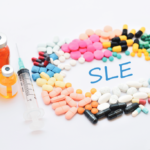NEW YORK (Reuters Health)—Tabalumab, a monoclonal antibody to B-cell activating factor, was modestly better than placebo in relieving symptoms of systemic lupus erythematosus (SLE), according to results from the ILLUMINATE-2 trial.
“Lupus is a complicated disease that does not behave the same way in all patients who share the clinical symptoms,” Dr. Joan T. Merrill from the University of Oklahoma Health Sciences Center in Oklahoma City told Reuters Health by email. “Developing treatments and figuring out how to optimize patient selection and dosing has proven to be a formidable task.”
Dr. Merrill’s team investigated the efficacy and safety of tabalumab in a 52-week multicenter, randomized, placebo-controlled trial of 1,124 patients with SLE. Just over three-quarters of the patients completed the trial.
More patients in the group receiving tabalumab 120 mg every two weeks than in the placebo group met the primary endpoint, achieving an SLE Responder Index 5 (SRI-5) improvement at week 52 (38.4% vs. 27.7%, p=0.002). This was not the case for patients in the group receiving tabalumab 120 mg every four weeks.
Treatment and placebo groups did not differ significantly, however, in any of the secondary outcomes—change from baseline in Brief Fatigue Index, time to first severe SLE flare, corticosteroid-sparing effects, and so on.
Treatment-emergent and serious adverse events occurred with similar frequency in the tabalumab and placebo groups, but significantly more tabalumab patients reported depression or suicidal ideation, the researchers reported in Annals of the Rheumatic Diseases, online Sept. 19.
Tabalumab had significant impacts on its immunological targets with decreases in mean total B cells, immunoglobulins and anti-dsDNA (double-strand DNA) antibodies.
Eli Lilly and Company, which funded the trials and employed several of the authors, discontinued development of tabalumab for SLE on the basis of the lackluster efficacy results in this and other phase 3 studies. The company had previously discontinued tabalumab development for rheumatoid arthritis for similar reasons.
“We probably need more carefully designed early phase trials to figure out, at lower cost, whether a treatment works, and if so, for what subset of the population,” Dr. Merrill said. “Then we might be able to put together pivotal Phase III trials that are also more efficient and streamlined, avoiding these enormous-sized, hugely expensive Phase III trial designs altogether.”
“Current trials have been failing because they were designed to allow disparate background medications to be used in disparate subsets of the populations,” Dr. Merrill explained. “This has been considered necessary for patient’s safety, but this is only true for patients with organ-threatening disease. In fact looking at data only in the sicker subset of patients, it is OK to design trials this way, since the severity of the illness means that over-treatment in the background will not blur interpretation of the data.”


